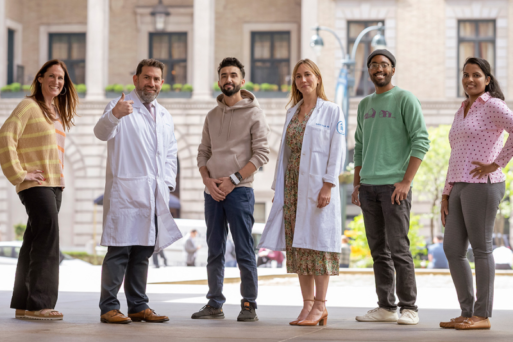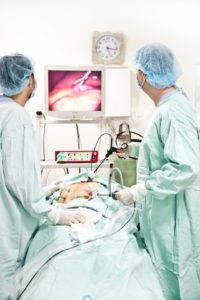
Trial participants and researchers from left to right: Sascha Roth, Dr. Luis Diaz, Imtiaz Hussain, Dr. Andrea Cercek, Avery Holmes, and Nisha Varguhese
Credit: Memorial Sloan Kettering Cancer Center
Happy tears filled the eyes of 18 rectal cancer patients. They were told their cancer was in complete remission following their participation in an immunotherapy clinical trial. Every single patient who participated was given the same result: no sign of cancer. This is a first in the history of cancer trials that is being heralded as miraculous.
All 18 rectal cancer patients had stage 2 or 3 tumors. For three weeks, they received an immunotherapy treatment called dostarlimab. The Merck pharmaceutical drug targets immune check points to bolster key regulators that assist the body in fighting off cancer cells. Researchers were hopeful that tumors would shrink, much like they do with the chemotherapy typically used prior to surgical removal. To their surprise, results far exceeded medical expectations.
Symptoms of bleeding and pain subsided for most trial patients after only a few treatments. Tumors ultimately vanished. These results are life-changing for the participants, who might have otherwise undergone years of aggressive treatments. These can often leave rectal cancer patients with debilitating bowel, bladder or sexual dysfunctions.

Surgeons screen for colorectal cancer during a routine colonoscopy.
Dr. Andrea Cercek, a medical oncologist that co-facilitated the study at Memorial Sloan Kettering Cancer Center, commented on the astounding results on their website: “The most exciting part of this is that every single one of our patients has only needed immunotherapy. We haven’t radiated anybody, and we haven’t put anybody through surgery. They have preserved normal bowel function, sexual function, fertility. Women have their uterus and ovaries. It’s remarkable.”
The MSK study was published in the New England Journal of Medicine. Dr. Cercek and her colleague, Dr. Luis Diaz, continue the study. They are hopeful that treating patients with immunotherapy at earlier stages of rectal cancer will bolster survival rate, while ensuring a better quality of life. Colorectal cancer, or cancer of the colon or rectum, is the third most common cancer in both men and women. Both researchers tout that a recent rise in colorectal cancers among people under the age of 50 further warrants better treatment options.
Whether immunotherapy is ultimately a cure for rectal cancer or not, 18 people are now living better lives. Sascha Roth, the first participant in the trial, said she is both “stunned and ecstatic.” Two years later, there is still no trace of cancer in her body.
Watch a video highlighting personal reactions from several of the patients in this study.

 Rectal Cancer Patients See 100% Remission With New Therapy
Rectal Cancer Patients See 100% Remission With New Therapy


 How Dare You Die Now!
How Dare You Die Now!

 “Help Me, Helen”
“Help Me, Helen”














